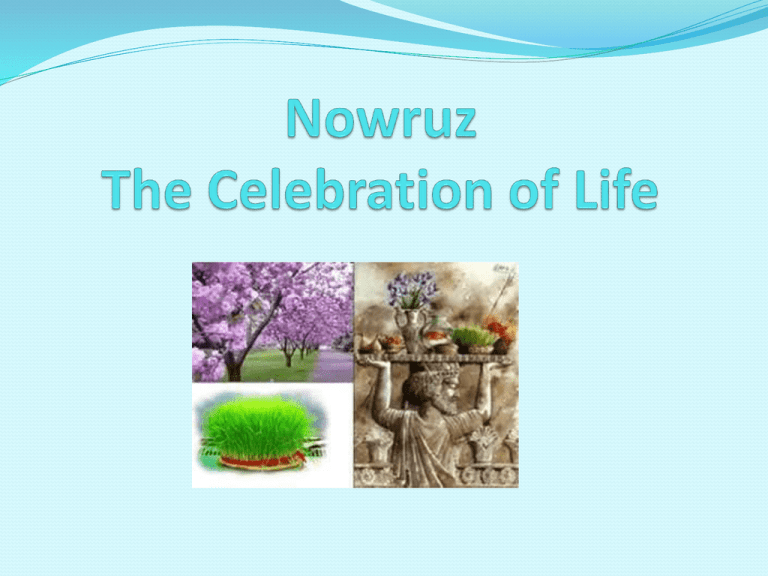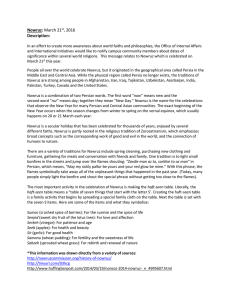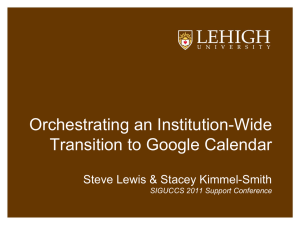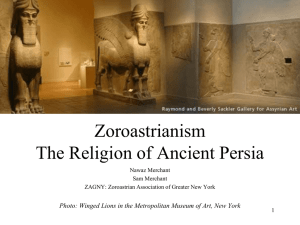NowRuz The Celeberation of Life
advertisement

Persian Calendars • Zoroastrian Calendar : • • • Jalili Calendar : • • • The Zarathushtrian Religious Era (ZRE) calendar was adopted in 1737 Before Christian Era (BCE). We are in 3750 (1737+2013) of ZRE. The Jalili calendar was adopted in 1079 Christian Era (CE) by Sultan Jalal al-Din, based on the recommendation of a committee of astronomers, including Omar Khayyam. We are in 1391 (2013-622) of Jalili calendar. Both calendars are solar and begin on the first day of Spring (March 21 or 22) Gregorian and Islamic Calendars Gregorian Calendar (Solar): Named after Pope Gregory who introduced it in 1582 CE. It begins from the year Jesus was born. • Islamic Calendar (Lunar): Begins from the year Muhammad’ migrated from Mecca to Medina (Hijra), in 622 CE. Differences in Calendars Gregorian and Islamic calendars are based on religious events: Gregorian: Birth of Jesus; Islamic: Mohammed’s migration; Zoroastrian and Jalili calendars are based on seasons: Both begin on the first day of Spring (March 21 or 22); When the lengths of night and day are equal; Months in Zarastrian/Jalili Calendars Spring: Autumn: 1-Farvardin (Guardian of spirits) 7-Mehr (Sun) 2-Ordibehesht (Truth) 8-Aban (Water) 3-Khordad (Perfection) 9-Azar (Fire) Summer: Winter: 4- Tir (Sirius) 5-Mordad (Immortality) 6-Shahrivar (Self-Control) 10-Dey (The Creator, Ahura Mazda) 11-Bahman (Good Mind) 12-Esfand (Holy Devotion) Nowruz “Nowruz” , “Norouz”, “Norooz”, “Noruz” is the first-day of the new year; Begins on the first day of Spring (first day of Farvardin); Most joyful festival of Persians; Celebration of life, Spring over Winter, light over darkness, good over bad, and health over illness; Two weeks of celebrations; Countries Celebrating Nowruz Celebrated in many former territories of the Great Persia: Afghanistan, Albania, Azerbaijan, Georgia, Iraqi Kurdistan, Kazakhstan, Kashmir, Kyrgyzstan, Tajikistan, Turkmenistan, Uzbekistan; By Zoroastrians in Pakistan and India, by Parsis in Indian subcontinent, and by Aryans in China, Balkans; The Jewish festival of Purim appears to be adopted from the Persian New Year. Nowruz in Persepolis Complex The famous Persepolis complex, Palace of Apadana and the Hundred Columns Hall were built for the specific purpose of celebrating Nowruz. In 487 BCE, Darius the Great celebrated Nowruz at his newly built Persepolis complex. Persepolis complex (487 BCE) Haji Firuz Herald of Nowruz; A black-faced person with bright red clothing and a felt hat, plays a tambourine and announces the coming of the New Year; Is based on the “Mir-Nowruzi” tradition, a comical figure chosen as king for the last five days of the year. The five-day king paraded the city with a group of singers and dancers for the Nowruz Celebrations. Chaharshanbeh Souri Jumping over bonfire: Celebration of fire on last Wednesday night before the Nowruz; “Give me your beautiful red color And take back my sickly pallor!” Khane Takani Deep house cleaning before arrival of Nowruz; The Zoroastrian idea of purifying the house to keep Evil away from the kingdom of Good; Nowruz Shopping “Kharid Eid” Purchase of new clothing to wear for the new year as well as sweets, fruits, …, for the celebrations; Haft Sin Symbol of new year; Seven items with names beginning with the letter S: The Haft Sin Items Sabzeh: Wheat sprouts growing a few inches tall, symbolizing rebirth; Samanoo: A sweet wheat pudding, symbolizing affluence and happiness; associated with Anahita, prepared by women who wished to have children; Senjed: Dried fruit of oleaster tree, symbolizing love; Sir: Garlic, symbolizing medicine, and warding off demonic powers and bad omens; Sib: Apple, symbolizing beauty and health; Somaq: Symbolizing the color of sunrise; Serkeh: Vinegar, symbolizing age and patience; Sonbol: Hyacinth flower, symbolizing the coming of spring; Sekkeh: Coin, symbolizing prosperity and wealth. Haft Sin Didd and Bazdid Visitation: On New Year’s Day families dress in their new clothing and begin a two-week celebration by visiting relatives and friends (Didd va Bazdid); Each visit is reciprocated. Elders give gifts (Eydi) to younger members; Friendships are renewed; Old animosities are forgiven; 13-Bedar On the thirteenth day, families go for an outdoor picnic; They sing, dance, play, and eat “Ashe Reshte”. Traditionally, girls of marriageable age tie wild grass tops into knots and make a wish that the following Nowruz may find them married and carrying their babies! Nowruz as Cultural Heritage International Nowruz Day was proclaimed by the United Nations General Assembly, in its resolution A/RES/64/253 of 2010. "At a time of global change and uncertainty, including in many regions where Nowruz is celebrated, the message of peace that lies at the core of this observance is especially important. My thoughts are with those communities observing Nowruz under difficult circumstances. This holiday is a reminder that we share a common fate and must work for a better future for all. " Secretary-General Ban Ki-moon President Obama’s Nowrooz Message http://www.youtube.com/watch?v=IYkH9J2VBdM Pictures of the Festival http://us.search.yahoo.com/search?ei=utf- 8&fr=vmn&type=zg-search.startnow.com-1_0-zg-rprp&p=nowruz








